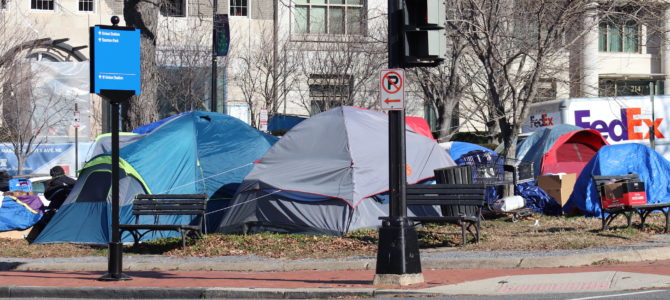
Come back next week to catch more of “Culture War with The Federalist’s Chris Bedford.”
America has been fighting a war on drugs for decades now, and for almost as long we’ve been told by the left and many libertarians on the right that the best way to end the war is to surrender. Legalizing drugs, they say, would solve a bunch of our country’s problems, including high rates of imprisonment, fatherlessness, crime, cartel activity, excess overdose deaths, budget deficits. The list goes on.
Over the past few years, a strange alliance has formed to push the legalization agenda. It includes committed left-wingers eager to better society by freeing all its criminals, like Rep. Alexandria Ocasio Cortez, Democratic Machiavellis looking to rev up the youth vote, like foreign billionaire George Soros, and big tobacco lobbyists looking to take advantage of all their arable land and industrial rolling machines, like former Speaker of the House John Boehner.
This alliance’s biggest focus has been marijuana, but it’s not the only target. In Washington, D.C., where I live, a ballot measure just essentially legalized hallucinogenic drugs by ordering the police to make that law’s enforcement their lowest priority.
Across the United States in the other Washington, the city of Seattle has opened a government center where junkies and the insane can walk in off the street and get their heroin safely.
In between the coasts, in towns and cities both large and small, left-wing activist mayors, attorneys general, city councils, and the rest have moved to suspend enforcement and refuse to press charges for drug crimes that elected legislatures have explicitly banned. They’re working to defund, demoralize, undercut and even prosecute their policemen to such a degree that the police know to stop enforcing laws on the books against drug dealing, drug use, public intoxication, and all the nudity, defecation, petty crime, and many of the sexual and violent crimes that go with it.
In Nashville, the DA says he won’t enforce marijuana laws. In Baltimore, State’s Attorney Marilyn Mosby announced she’ll no longer prosecute drug possession, or other “low-level” crimes like prostitution. She justified it as a coronavirus measure, but do you really think she’ll change back later if she can get away with not doing so?
Just a few years ago, drug legalization was a dream for Utopians: A bunch of John Lennon-inspired claptrap. “Imagine all the people skipping church and injecting fentanyl.” How wonderful, how peaceful, how delightfully charming. The hallucinogen ballot campaign in D.C. was led by young white people with dreadlocks — some rich lobbyists’ well-deserved kids, no doubt — holding up pictures of Mayan indigenous people like theirs was some kind of Fern Gully freedom campaign.
But it isn’t a dream anymore, is it? For a lot of us, it’s right outside our doors. Heroin and meth might be ripping apart your city, your town, your neighborhood. Or maybe it’s even closer than that: your friends, your siblings, your children.
Normalizing drug use is no longer an idea, it’s a reality. And if you want to see what that reality looks like, take a walk through once-thriving downtown Denver. Or 90 minutes south, to the naturally majestic Colorado Springs. Take the train to D.C.’s Union Station, a gorgeous gateway to our nation’s capital now populated with tents and completely overrun by filthy, barely clothed muttering madmen, open drug deals, drug use, and unconscious users.
Visit Austin, Texas, a city that’s long celebrated its liberal free spirit — and been a lot of fun for it — where today, public parks are covered in tents, the gorgeous paths along the canal reek of human waste, and walkers on a Sunday morning are menaced by junkies on couches blocking the trail and underneath the bridges. I know because I walked it just the other day on the way back from St. Mary’s Cathedral to meet a friend for Sunday lunch; not quite a 2 a.m. stroll through Central Park.
In 2019, Austin had 1,086 unsheltered homeless people living in tents, in cars, or simply sleeping on the bare earth. In 2020, that number had grown 45 percent to nearly 1,600 people. Nobody has counted so far this year, but everybody knows the number is even higher.
How did they get there? Did this just happen? Is the cost of cruel Texas policies? It turns out, the cause is easy to trace: In 2019, the city’s mayor, Stephen Adler, got the City Council to repeal Austin’s camping ban. He said the best way to fix homelessness was to legalize all of it, then spend more than $73 million in one year “fighting” it.
That’s more than $45,000 per homeless person. Of course, by spending so much on homelessness, Adler got more of it than ever. Supply and demand must not be a big subject at Princeton, or the law school at UT-Austin, which Adler also attended.
The same thing is happening in New York City, New Orleans, Portland, Los Angeles; our cities are becoming unlivable. At the same time, they’re growing more expensive and more antagonistic toward those who pay the taxes, who own the businesses, and who patrol the streets.
Where I live, national museums have been closed for more than a year and the restaurants and community crushed in the name of protecting public health, but women who complain of being followed and harassed outside Union Station or near public parks are ignored. Last year in D.C., there were 60 carjackings from January through April. This year, there were more than 200.
Just think about how much of our normal lives have been stolen in the name of public health and fear of disease while public spaces in our beautiful cities have been surrendered to homeless addicts, while violent criminals go unmolested, and while insane people defecate and threaten and use drugs in the streets. Do our elected officials care about public safety and disease? Or is it all a lie? It sure seems like it’s a lie.
There are a lot of good intentions out there — a lot of legalizing Utopians aren’t bad people. Many of them, like Austin’s Princeton graduate mayor, are over-educated for sure. They know a whole lot that isn’t so — and that is where they go wrong.
Because here’s the reality you see walking through any one of these cities: All those highly educated libertarians and liberals with their degrees and their jobs are so sure of their worldview and so unbelievably impressed with themselves that they think people do drugs just like they did — smoking pot at a concert or while playing video games on the weekend, taking mushrooms at some Rocky Mountain music festival.
But the problem is most people don’t use drugs like that. Instead, they lose their jobs, become estranged from their families, live on the street, stop bathing, rob each other — and you — for money, and use it to inject Chinese fentanyl into their veins and pass out on the sidewalk.
You don’t need to take my word for it: Go to Colorado Springs, go to Denver, go to Seattle, go to Portland, go to Austin. Look up a video of San Francisco: A great city filled with history, wonderful food, beautiful architecture, and American history that you can’t happily visit anymore because it will break your heart.
Come to Washington, D.C. and see Union Station. Visit the filth-covered lawns our leaders try to call “green spaces” with a straight face. Or maybe you can check out the mayor’s Black Lives Matter camp for drug users and neighborhood rioters: It’s right across from the White House and a must-see tourist destination.
This experiment has failed. It was obviously going to fail. Maybe it didn’t seem like that in those UT-Austin dorm room conversations where everyone agreed on a better world and passed the bong, but in the real world — where things are mean and people can be very ugly to themselves and each other — it was clear from the beginning.
Some places are working to make it better. It turns out you aren’t required to live in a hellhole of tents and needles, and that kind of reality starts to force action. As one self-described progressive interviewed in a recent Vice documentary on Austin said, “Every time I step in human [excrement], I get a little less liberal.”
Just a little? That’s mighty generous of her. But she’s not alone. In Austin, 57 percent of the city just voted to reinstate criminal penalties for camping on public property. Austin is a very left-wing city, but most liberals don’t want to live in dangerous filth. The Texas state legislature is contemplating making that camping ban statewide, and they should — although Austin ought to sort out one of its own problems once in a while.
America is a great country, and a great country should be a beautiful and safe one. But as cities like Austin seek to turn back the clock on their experiment, and as cities like San Francisco and Los Angeles seem so ideologically dedicated to their mission they’re willing to kamikaze straight into reality, cities like our nation’s capital and countless others look at that and think, “That seems like a good idea. I think I’ll give that a try myself. Hasn’t worked anywhere, so why not? Equity, no consequences — that’s the new justice, isn’t it?”
If you see it in your community, put a stop to it. Don’t hate the activists — so many are simply deeply misled, and your anger will turn off potential allies — but be firm because this is no longer an experiment or a theory. We have the proof, and there are very few places in this country that aren’t just a few short hours’ drive from all the evidence you need.
Don’t let this happen in your town. And don’t let it be a partisan issue: No matter your politics, you deserve to live in safety.









